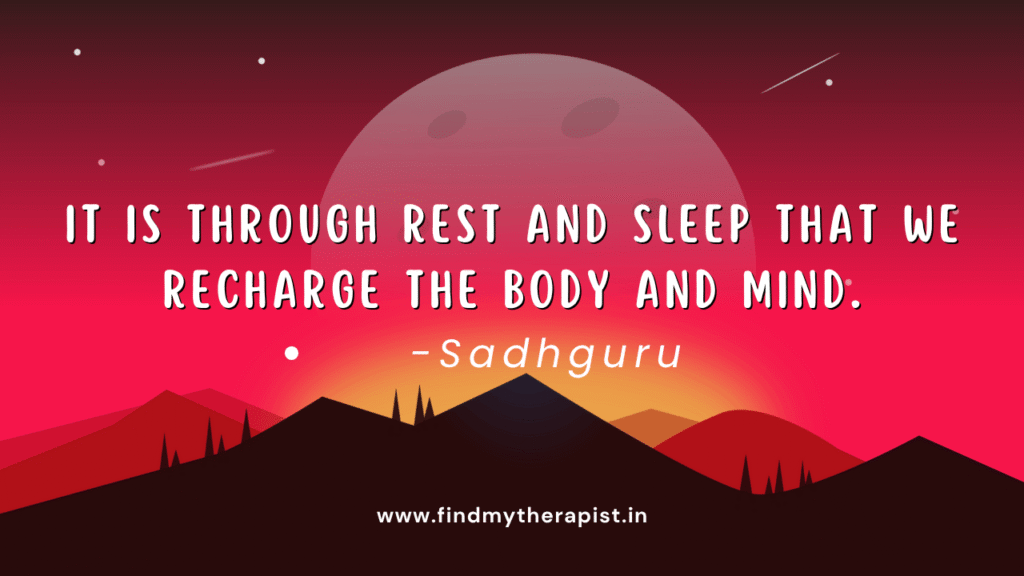Sleeping Disorder
Battling Insomnia or Sleep Apnea? Find a Therapist Near You to Restore Healthy Sleep
Sleeping Disorder
Comprehensive Sleep Disorder Counselling in India
Sleep disorders affect millions of Indians, disrupting energy, mood, and daily routines. Our specialised sleep disorder counselling combines medical collaboration and behavioural strategies, addressing insomnia, sleep apnea, and circadian rhythm issues, to help you reclaim restful, rejuvenating nights.
Insomnia and Difficulty Falling Asleep
You spend more than 30 minutes trying to fall asleep on most nights, which leaves you feeling frustrated and awake long after bedtime. Chronic insomnia can erode daytime focus, increase stress, and make it hard to maintain a healthy routine.
Frequent Nighttime Awakenings
You wake up multiple times throughout the night—sometimes gasping for air or unable to return to sleep for over 20 minutes. These interruptions fragment your sleep cycles, leading to persistent fatigue and impaired memory.
Excessive Daytime Sleepiness
Whether it’s sleeping too much or not enough, or experiencing sudden weight changes, these are common indicators of depression.
Loud Snoring or Pauses in Breathing
Your partner notices loud snoring, choking sounds, or breathing pauses, which may signal sleep apnea rather than a simple sleep issue. Untreated sleep apnea increases the risk of high blood pressure, heart problems, and daytime exhaustion.
Restless Legs or Uncomfortable Sensations
You experience tingling, crawling, or aching sensations in your legs that intensify at night, making it hard to stay still or fall asleep. Restless Legs Syndrome often disrupts your sleep onset and reduces overall sleep quality.
Common Signs and Symptoms of Sleep Disorders
Recognising the warning signs of a sleep disorder is the first step toward better rest and well-being. If you notice any of the following patterns, our sleep disorder counselling team can help you understand and address the root causes.

Focused Intake Interview
In the first meeting, we map out your typical night’s sleep, daytime fatigue, and any medical concerns in a concise assessment. This helps us tailor interventions to your specific sleep disorder symptoms.
Goal-Oriented Planning
Together, we set measurable objectives, such as reducing nightly awakenings or increasing total sleep time by one hour. This collaborative planning ensures you remain motivated and see real progress.
Evidence-Based Techniques
We use methods like cognitive-behavioural therapy for insomnia (CBT-I), relaxation training, and breathing exercises adapted for Indian lifestyles. These approaches have been scientifically proven to address various sleep disorder challenges.
Practical Homework Assignments
You receive clear, actionable tasks—such as keeping a sleep diary or practising progressive muscle relaxation each evening. These exercises reinforce session learnings and accelerate your journey to better sleep.
Ongoing Progress Reviews
After major milestones—like a week of uninterrupted sleep or improved daytime alertness—we revisit goals and refine strategies. Regular check-ins help prevent relapse and maintain the benefits of treatment.
What to Expect in Sleep Disorder Consultation Sessions
Each session follows a clear, structured format so you know exactly how to improve your sleep disorder step by step.
Restless Leg Syndrome Relief
We teach lifestyle adjustments, such as evening stretching routines and dietary changes, that reduce leg discomfort at night. Combining these with mindfulness techniques can significantly ease symptoms.
Narcolepsy Guidance
For those experiencing excessive daytime sleepiness, we develop structured nap schedules and stimulant-management plans in consultation with neurologists. Counselling also helps you cope with the emotional impact of narcolepsy on daily life.
Shift Work Sleep Disorder Solutions
Therapists advise on strategic light exposure, meal timing, and sleep environment modifications to help shift workers adapt their circadian rhythms. These evidence-backed strategies improve alertness on the job and sleep quality off duty.
Managing Specific Sleep Conditions
Our sleep disorder specialists in India address a wide range of conditions to restore your well-being.
Break the Cycle of Restlessness — Get Help from a Sleep-Focused Therapist.
Reach Out
How Therapy Can Help You Sleep Better
Struggling with sleep can feel isolating, but therapy offers a supportive path to healing. Our counsellors help uncover the psychological and behavioural patterns behind your disrupted sleep.
Sleep Hygiene Training
You’ll learn practical strategies like setting bedtime routines, limiting screen use at night, and aligning your sleep schedule with your daily routine—adjusted to your lifestyle and cultural context.
Addressing Root Stressors
Therapists help identify underlying causes such as work pressure, academic anxiety, or emotional strain in relationships that may be silently impacting your sleep.
Managing Sleep-Related Anxiety
Many clients worry about “not sleeping again tonight,” which fuels the very problem. Our therapy sessions break this cycle using mindfulness, relaxation, and cognitive reframing techniques.
Support for Behaviour Change
Whether it’s cutting back on caffeine, managing screen addiction, or resetting the body clock after years of bad sleep habits, we guide you with achievable steps and ongoing encouragement.
Frequently Asked Questions
Yes. Therapists use evidence-based approaches like Cognitive Behavioral Therapy for Insomnia (CBT-I) to help you change thought patterns and habits that interfere with restful sleep.
Therapy can help with insomnia, stress-related sleep loss, nightmares, anxiety-induced wakefulness, and adjusting to life changes like parenthood or shift work.
No. Our therapists do not prescribe medication. They focus on behavioural and psychological techniques that promote natural, long-term sleep improvement. If medication is needed, we may recommend a referral to a sleep specialist.
Most people start noticing better sleep within 4 to 6 sessions, especially with consistent effort and lifestyle changes discussed during therapy.
Absolutely. Long-term sleep issues are common, but therapy offers structured support to gently retrain your body and mind, even if you’ve struggled for years.







